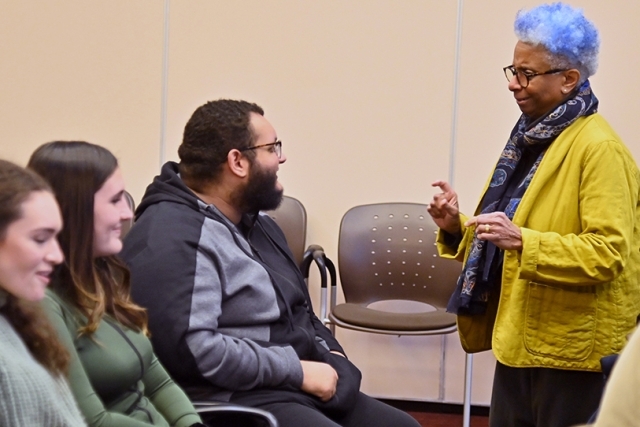
Who is my neighbor?
That was the question posed by M. Shawn Copeland, Ph.D., Professor Emerita of Systematic Theology, the Department of Theology and the Program in African and African Diaspora Studies at Boston College, during her third of four lectures during the 2022–23 academic year, with the theme of “Visions of Freedom: a Political Theology for Our Time.”
The lecture whose title was that very question, was held on February 9 in the D’Angelo Center on the Queens, NY, campus. Dr. Copeland is this year’s holder of the St. John’s University Vincentian Chair of Social Justice.
Noting the recent tragedies that included the murder of Tyre Nichols, as well as the mass shootings in Monterey Park, CA, and Half Moon Bay, CA, Dr. Copeland stressed that this is a critical time to discuss the notion of neighborliness and solidarity—in a world that seems sorely lacking in both. She added that some may think that the mere discussion borders on “ridiculous optimism.”
“It is precisely because we have become so estranged and alienated from one another—indeed alienated from our own humanity and the humanity of others and who we have ‘othered’—that we need to think about neighborliness and solidarity,” Dr. Copeland explained.
She noted that racism conditions our response to the biblical command, “Love thy neighbor,” both in society and in church, and racial bias sets up Black and Brown people as suspicious, criminal, or illegal.
“The very stereotypes that claim to despise seep into our encounters with those whose race differs from our own, whether they are police officers, prospective students, surgeons, waiters, nurses, bus drivers, hygienists, teachers, salespersons, or elected officials,” Dr. Copeland said. “On the micro level, many repugnant aspects of racism crop into the everyday lives of people of color in particular, exhausting and infuriating them. Everyday activities like jogging, leisure walking, banking, dining out, registering for school, inquiring about church membership, hailing a taxi, riding a train, and air travel are all fraught with ambiguous and often negative currents. Racism directs these currents, interrupting interpersonal routines between Whites and non-Whites.”
Pointing to the parable of the Good Samaritan, Dr. Copeland enumerated love of neighbor using the example of an individual from a group disdained by the Jews: the Samaritans. After sustaining a horrific assault, a man only finds assistance from an individual belonging to a culture to whom the group Jesus speaks to have been culturally inured to despise.
Jesus makes it clear the injured man is ignored by a priest and a Levite—people who are required by law to assist him. Judaism demanded everyone be treated as a neighbor, no matter what the relationship, Dr. Copeland said. “All are to be treated with regard, respect, and love.”
She added that Jesus stressed that neighborly attention cannot be restricted to those inside our immediate religious, social, cultural, or racial groups. “If we are to be called God’s children, we are obliged to act with practical care and compassion to all, especially those whose standing differs from our own.”
Prior to the lecture, a group of students shared lunch with Dr. Copeland in the D’Angelo Center for a more in-depth discussion of the topics presented in her lecture.
“I really love these kinds of opportunities,” said Anthropology major Alexa Mangione. “One of the things we love about St. John’s are the relationships we develop with faculty, and this is a prime example of that. None of us here are Theology majors, yet we were invited to have this opportunity by a professor who thought we would have a vested interest in this topic.”
Biology major Sara Pepushi offered that she found the historical context in which Dr. Copeland put the Bible very relevant. “She spoke to our modern systems and institutions, and how theological interpretations of modern-day problems can really help us.”
“Dr. Copeland’s question prompts one of the central parables of the New Testament—the Good Samaritan,” noted Rev. Patrick J. Griffin, C.M. ’13HON, Executive Director, Vincentian Center for Church and Society. “Inviting a consideration of the breadth of who can be called neighbor, and the depth of who needs to be neighbor, Dr. Copeland challenged the ways in which racism and xenophobia condition our understanding of what it means to be human and how to live humanely. She calls people of good will to act in responsible and collaborative solidarity on behalf of their neighbor. It is a summons that we all need to hear.”
Related News
Q&A with School of Education Alumna Linda I. Rosa-Lugo, Ed.D. ’77ED, ’79M.S.Ed.
Linda I. Rosa-Lugo, Ed.D. ’77ED, ’79M.S.Ed., recently accepted a new role as President of the American Speech-Language-Hearing Association (ASHA). Prior to this, Dr. Rosa-Lugo has been an active...
TSOE Alumna Appointed Director of Curriculum in Amityville
Jessica Kemler ’99ED,’22Ed.D.—a double alumna of The School of Education at St. John’s University—began the new year as the new Director of Curriculum in the Amityville, NY, School District. “We are...
Alumna Celebrates Book Launch After Career Change
After developing a passion for helping the younger generation, Ashley Wilson ’14M.S.Ed. pivoted from a career in the music industry to work as an educator. She is also making her mark through her new...
